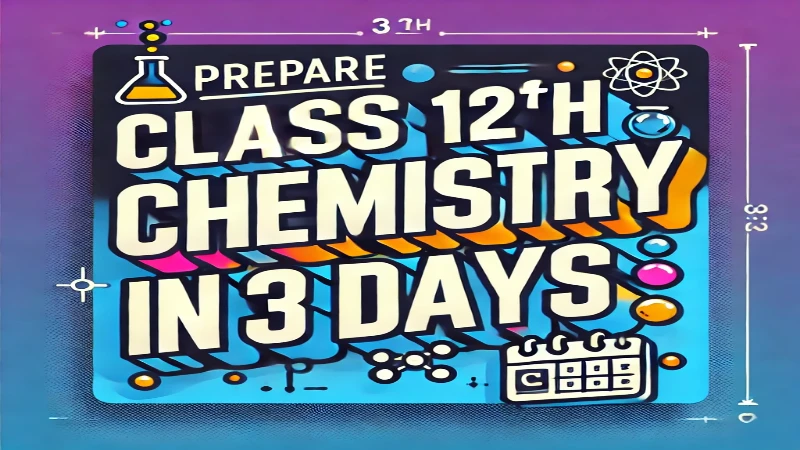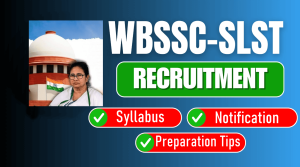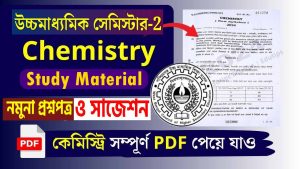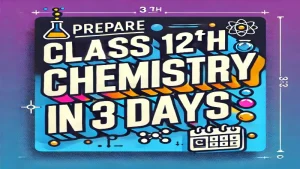Prepare Class 12th Chemistry in 3 day is challenging but possible with the right strategy. You need to focus on key concepts, prioritize important topics, and practice effectively. Here’s a structured plan to help you maximize your preparation in three days.
Day 1: Physical Chemistry & Inorganic Chemistry
1. Prioritize Important Topics
Physical Chemistry involves numerical problems, and Inorganic Chemistry consists of theoretical concepts. Focus on high-weightage topics such as:
- Solid State
- Electrochemistry
- Solutions
- Chemical Kinetics
- Coordination Compounds
- p-Block Elements
- d- and f-Block Elements
2. Physical Chemistry – Concept Clarity & Numerical Practice
Since Physical Chemistry has formulas and numerical problems, follow these steps:
Electrochemistry:
- Understand Nernst Equation and how to apply it.
- Learn about Electrochemical Cells and conductance.
- Solve numerical problems on cell potential
- Farady Law
- ohlrausch’s Law.
Solutions:
- Study Raoult’s Law and its applications.
- Revise colligative properties and their numerical problems.
Chemical Kinetics:
- Learn the rate laws, order of reaction, and activation energy concepts.
- Solve problems on first-order and second-order reactions.
3. Inorganic Chemistry – Quick Revision of Concepts
Inorganic Chemistry is mostly theoretical. Go through NCERT thoroughly, focusing on:
Coordination Compounds:
- Revise Werner’s Theory, VBT & CFT, and nomenclature of complexes.
- Understand color, stability, and isomerism in coordination compounds.
p-Block Elements (Group 15-18):
Focus on Oxides of Nitrogen, Phosphorus Compounds, and Anomalous Properties of Oxygen.
d- and f-Block Elements:
- Study properties of transition elements and color formation in d-block elements.
- Revise lanthanoid contraction and its effects.
4. Quick Self-Assessment
Solve previous years’ questions related to Physical and Inorganic Chemistry.
Attempt MCQs and numerical problems to test your understanding.
Day 2: Organic Chemistry
1. Understand General Reaction Mechanisms
- Organic Chemistry requires conceptual clarity of reaction mechanisms. Revise:
- Nucleophilic and Electrophilic Substitution Reactions
- Addition and Elimination Reactions
- Reaction Intermediates (Carbocation, Carbanion, Free Radicals)
2. Important Topics in Organic Chemistry
Haloalkanes & Haloarenes:
Learn SN1 and SN2 mechanisms.
Focus on chemical reactions of haloalkanes and haloarenes.
Alcohols, Phenols, and Ethers:
Study preparation and properties of alcohols and phenols.
Learn electrophilic substitution reactions of phenols.
Aldehydes, Ketones, and Carboxylic Acids:
Revise nucleophilic addition reactions.
Understand Aldol and Cannizzaro Reactions.
Amines:
Learn basicity of amines and diazotization reactions.
Revise Hoffmann’s bromamide reaction and Gabriel phthalimide synthesis.
Biomolecules, Polymers & Chemistry in Everyday Life:
Revise structure of glucose, DNA, and RNA.
Learn biopolymers and synthetic polymers.
Study drugs, detergents, and preservatives in Chemistry in Everyday Life.
3. Solve Previous Year Questions & Mock Tests
Solve important organic chemistry problems from past papers.
Attempt reaction-based MCQs and mechanism-based questions.
Day 3: Revision & Mock Tests
1. Go Through Short Notes & NCERT Examples
Revise summary points from NCERT.
Go through NCERT Intext & Exercise Questions.
2. Solve Past Year Papers & Mock Tests
Attempt a full-length mock test in an exam-like environment.
Identify weak areas and do quick revisions.
3. Time Management for Exam Day
Read the paper carefully and attempt questions you are most confident about first.
Manage time wisely:
Numericals (Physical Chemistry) – 35 minutes
Theoretical Questions (Inorganic Chemistry) – 25 minutes
Reaction-Based Questions (Organic Chemistry) – 30 minutes
Long-Answer Questions – 30 minutes
Final Tips for Success
- Stick to NCERT/Your Board – Most exam questions are from NCERT textbooks.
- Practice Numerical Questions – Focus on Electrochemistry, Solutions, and Chemical Kinetics.
- Revise Organic Name Reactions – Learn important mechanisms and exceptions.
- Use Mnemonics and Tricks – Helps in remembering periodic trends and name reactions.
- Stay Calm and Confident – Avoid last-minute stress and get proper rest before the exam.
By following this structured plan, you can maximize your preparation and perform well in your Class 12 Chemistry exam in just three days.








